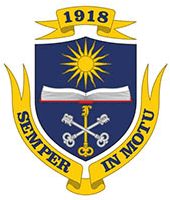The Faculty of Pharmaceutics is one of the youngest in Voronezh State University. It was created by Professor Alexey Slivkin, DSc in Pharmaceutical Sciences. Today, highly qualified specialists from the fields of pharmacy, biology, medicine, and even philology work at the faculty.
The Faculty of Pharmaceutics has a research group headed by Alevtina Gudkova, DSc in Pharmaceutical Sciences, Associate Professor at the Department of Pharmaceutical Chemistry and Pharmaceutical Technology, Anna Buzlama, DSc in Medicine, Head of the Department of Pharmacology and Clinical Pharmacology, and Anna Chistyakova, PhD in Pharmacy, Associate Professor at the Department of Pharmaceutical Chemistry and Pharmaceutical Technology. Together they are working on medicines based on plant raw materials, and they are very successful. Recently, they have managed to release a patent related to the study of a new pharmacological action of a well-known plant, Greek-valerian polemonium, as they established that the herbal infusion could reduce blood sugar level.
“My career in science began in 2003, when I was a third-year student and began studying at the Department of Pharmaceutical Chemistry and Pharmaceutical Technology. My “science mum”, Tatiana Brezhneva, PhD in Pharmacy, helped me believe in myself and inspired my research activities. Now I try to treat my students exactly as she treated me. Professor Alla Sorokina, DSc in Pharmaceutical Sciences, also played an important role in my scientific career. She was my science adviser from Sechenov University. I’m incredibly grateful to these two women,” said Alevtina Gudkova.
Alevtina Gudkova began her research into Greek-valerian polemonium in 2006 when she was a fifth-year student. Her PhD research was dedicated to the study of this plant and based on the isolation of pure saponins and the assessment of their hypoglycaemic activity that affects the plant’s ability to lower blood sugar levels. Alevtina Gudkova is still continuing her research related to polemonium.
Her interest in this plant was inspired back in 2004 by Alexey Slivkin, former dean and founder of the Faculty of Pharmaceutics. At that time, there were only a few fragmentary studies of the chemical composition and pharmacological activity of Greek-valerian polemonium, the underground organs of which were recommended to be used as an expectorant and sedative. Moreover, the sedative effect of polemonium exceeds the effect of valerian by several dozens of times. Comprehensive in-depth research into the chemical composition and pharmacological activity of polemonium was a very relevant area of study.
“Of course, we cannot state that Greek-valerian polemonium can help people with type 1 diabetes mellitus and we cannot state it can treat type 2 diabetes mellitus in neglected cases. However, an infusion of Greek-valerian polemonium can be effective for those with prediabetes or a predisposition to the disease,” explained Alevtina Gudkova.
The properties of Greek-valerian polemonium were further studied by Anna Chistyakova under the scientific supervision of Alevtina Gudkova. She studied the grass of the plant for her thesis and obtained liquid extracts based on it. As of today, researchers from the Faculty of Pharmaceutics have conducted so many studies on Greek-valerian polemonium that they are planning to release a monograph which would contain the materials covering all the period of their study of this plant.
“We often joke that we were united by polemonium. Our goal right now is to find new sources and develop new technologies and methods of standardisation of Russian herbal medicines. This will really useful for import substitution and the promotion of Russian production,” said Anna Chistyakova.
Active research into the chemical composition of Greek-valerian polemonium is inextricably linked with non-clinical studies. This explains why Alevtina Gudkova and Anna Chistyakova, being employees of the Department of Pharmaceutical Chemistry and Pharmaceutical Engineering, closely collaborate with Anna Buzlama, Head of the Department of Pharmacology and Clinical Pharmacology.
Anna Buzlama is one of the few employees of the Faculty of Pharmaceutics who is not a graduate of Voronezh State University. She studied at Burdenko Voronezh State Medical University as she wanted to become a doctor. But by her third or fourth year she realised she was more interested in research than practical medicine. After graduation, Anna took a postgraduate residency programme and later became a lecturer at Voronezh State University. She has been working at VSU for about 20 years now.
“Today our department is working not only on phytoneering, which is developing medicines based on plant raw materials, but also on non-clinical studies. We believe this broadens our minds as it involves various interconnected areas, such as medicine, pharmacy, botany, clinical medicine, pharmacology, and pharmacognosy,” said Anna Buzlama.
The representatives of a German company Bionorica that produces medicine became interested in the research of scientists from the Faculty of Pharmaceutics. They helped organise a scientific laboratory which is called Professor Michael A. Popp Phytoneering Research Laboratory and purchase laboratory animals for our research.
The group of researchers from the Faculty of Pharmaceutics also collaborates with Russian producers. For example, those working on pharmaceutical technologies work closely with Sotex. They are also planning to establish cooperation with the pharmaceutical company Evalar.
The group of women scientists have managed to establish cooperation not only between the department but also between the faculties. For instance, employees of the Department of Pharmacology and Clinical Pharmacology collaborate with the Faculty of Physics studying nanoparticles together. They are also working with the Faculty of Computer Sciences: researchers from the Faculty of Pharmaceutics offered their colleagues to design new hardware-software methods for non-clinical studies.
Students who are interested in the researchers’ activities also help them in their studies.
“Those who join our study area work comprehensively on their part of the experiment, starting from the theoretical justification of the study’s relevance and gradually moving on to laboratory studies, in particular to the study of the chemical composition of plant raw materials and development of optimal medicine compositions based on it, and they are also involved in non-clinical studies. Students join our work gradually, they get used to it, and soon we are on the same page. Sometimes we even have a tacit understanding. We have a friendly team and trusting relationships. It’s “family science”, so to say. Students enjoy working with us,” said Alevtina Gudkova.










